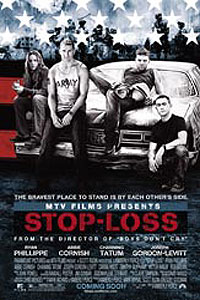Stop-Loss (R) ★★½
 When Stop-Loss finally ceases beating around the bush--no, not George W.--it's powerful, stirring and even bipartisan in a sense. Unfortunately, it takes a while to get there.
When Stop-Loss finally ceases beating around the bush--no, not George W.--it's powerful, stirring and even bipartisan in a sense. Unfortunately, it takes a while to get there.
Story
When U.S. soldiers return home from fighting in Iraq (and obviously anywhere else not touched upon in this movie), the war doesn't necessarily end. Stop- Loss follows a trio of those soldiers--Sgt. Brandon King (Ryan Phillippe), Tommy Burgess (Joseph Gordon-Levitt) and Steve Shriver (Channing Tatum)--from Tikrit all the way back to their small Texas hometown, to which they return heroes. Brandon is the natural-born leader with a solid head on his shoulders; Tommy's head is considerably less solid; and Steve is the textbook alpha-male, quick to explode bits of virility. However, they're all now struggling to adjust to the normalcy of home life--even Brandon, who can't shake the horrifying combat flashbacks. But then Brandon learns that he has been stop-lossed: forced to return to active duty in Iraq against his will. The direct order couldn't have come at a worse time for Brandon, who had just washed his hands of Iraq's atrocities and was planning on staying home for good. Before long, he's AWOL, on his way to Washington, D.C., where he hopes to find the senator who promised to help him. Brandon makes a few painful but necessary pit stops en route to D.C. that further fuel his contempt for the war. Ultimately, he is faced with a can't-win decision that no one should ever have to make.
Acting
The acting in Stop Loss, much like the film itself, runs very hot and cold. For female viewers, of course, it'll all be hot primarily because of Phillippe and Tatum, both of whom are in Army mode (read: shirtless). But the performances are a slightly different story. Phillippe has carved out a niche for himself with these brooding, serious roles of late (i.e., Breach), but they don't seem like much of a stretch. He succeeds for the most part as Stop-Loss' imperiled protagonist, although he has a tendency to kick it into angst overdrive on occasion. Tatum (Step Up), on the other hand, rarely succeeds in the movie and does seem like he's stretching his limits during scenes that call for conveyance of real emotion--scenes of emotional shirtlessness, if you will, as opposed to the physical kind. Indie veteran Gordon-Levitt (The Lookout), as usual, is the best of the bunch, making easy work of the movie's most genuine, complex character. Abbie Cornish (Somersault)--Phillippe's rumored real-life girlfriend--plays Steve's girlfriend and the one with whom Brandon drives across the country. She hides her Australian accent well enough for credibility as a born-and-bred Texan, but her performance and presence are forgettable.
Direction
Writer-director Kimberly Peirce apparently doesn't make movies unless she needs to get something off her chest. Nine years ago, she had something very powerful to say on the subject of (trans)gender discrimination and sexual violence with Boys Don't Cry (for which Hilary Swank won an Oscar), and now the Iraq War is on her brain. Whereas most of today's vocal war opponents simply aim to incite anger and outrage over the war, Peirce does them all one better: She's staunchly anti-war, sure, but she is also pro-soldier, and Stop-Loss is the soldiers' story before it is a Bush diatribe. Peirce is effective at speaking on the soldiers' behalf and making the final third of the film very stirring. But the transition to get to that point? Not so much. The difference between much of the film and its final act is like night and day--or more fittingly, like dramatization and documentary. Stop-Loss is an MTV Films production and feels every bit like it early on, complete with overly juiced-up theatrics and music that detract from the story's humanistic aspect. Which would be one thing if it stayed that course throughout, but it doesn't; it makes an unsubtle turn near the end, switching from a vendetta, man-on-the-run story to an insightful, topical commentary on the war and its soldiers. Fortunately, that commentary outweighs the unevenness.
Bottom Line
Hollywood.com rated this film 2 1/2 stars.
To get the full Quicklook Films experience, uncheck "Enable on this Site" from Adblock Plus
box office top 10

Civil War Released: April 12, 2024 Cast: Kirsten Dunst, Wagner Moura 11.1M

Abigail Released: April 19, 2024 Cast: Melissa Barrera, Dan Stevens 10.2M

Godzilla x Kong: The New Empire Released: March 29, 2024 Cast: Rebecca Hall, Brian Tyree Henry 9.5M

The Ministry of Ungentlemanly Warfare Released: April 19, 2024 Cast: Henry Cavill, Eiza Gonzalez 9M

Spy x Family Code: White Released: April 19, 2024 Cast: Takuya Eguchi, Saori Hayami 4.9M

Kung Fu Panda 4 Released: March 8, 2024 Cast: Jack Black, Viola Davis 4.6M

Ghostbusters: Frozen Empire Released: March 22, 2024 Cast: Paul Rudd, Carrie Coon 4.4M

Dune: Part Two Released: March 1, 2024 Cast: Timothée Chalamet, Rebecca Ferguson 2.9M

Monkey Man Released: April 5, 2024 Cast: Dev Patel, Sikandar Kher 2.2M

The First Omen Released: April 5, 2024 Cast: Nell Tiger Free, Bill Nighy 1.7M






